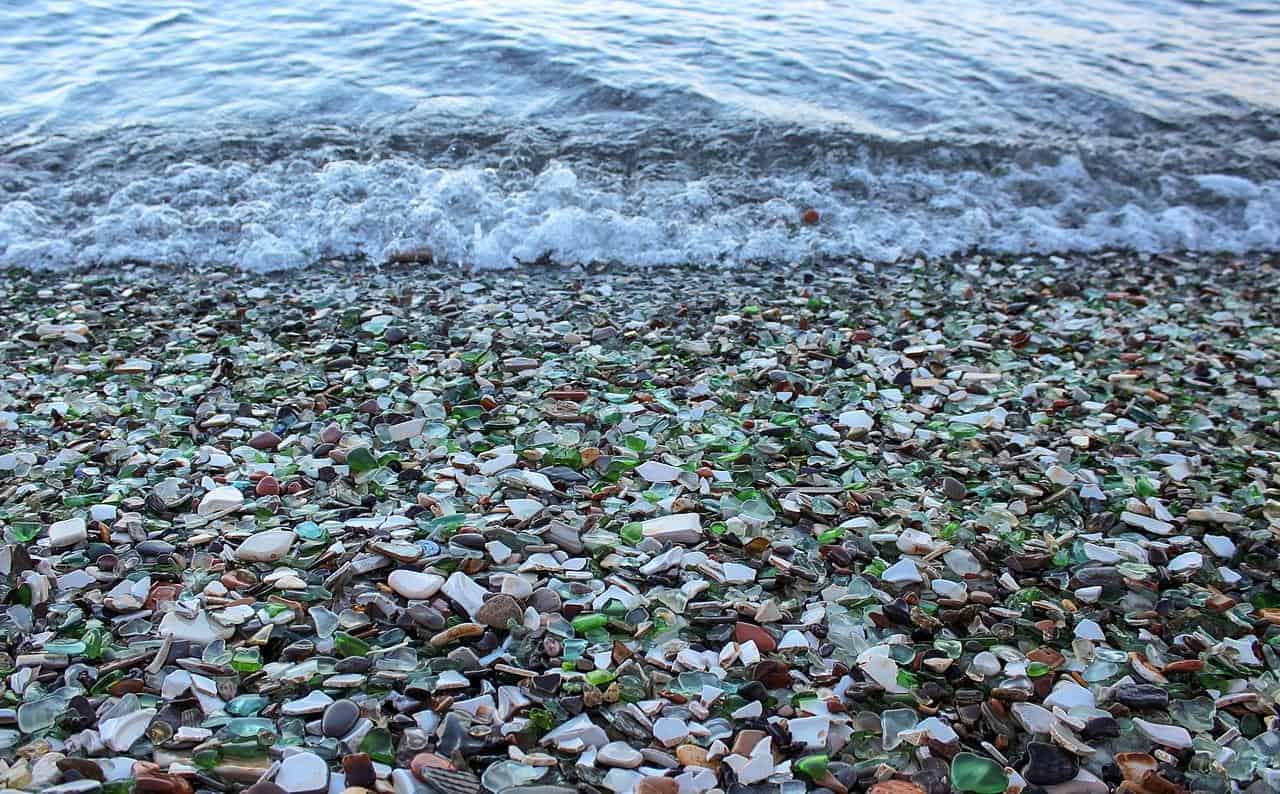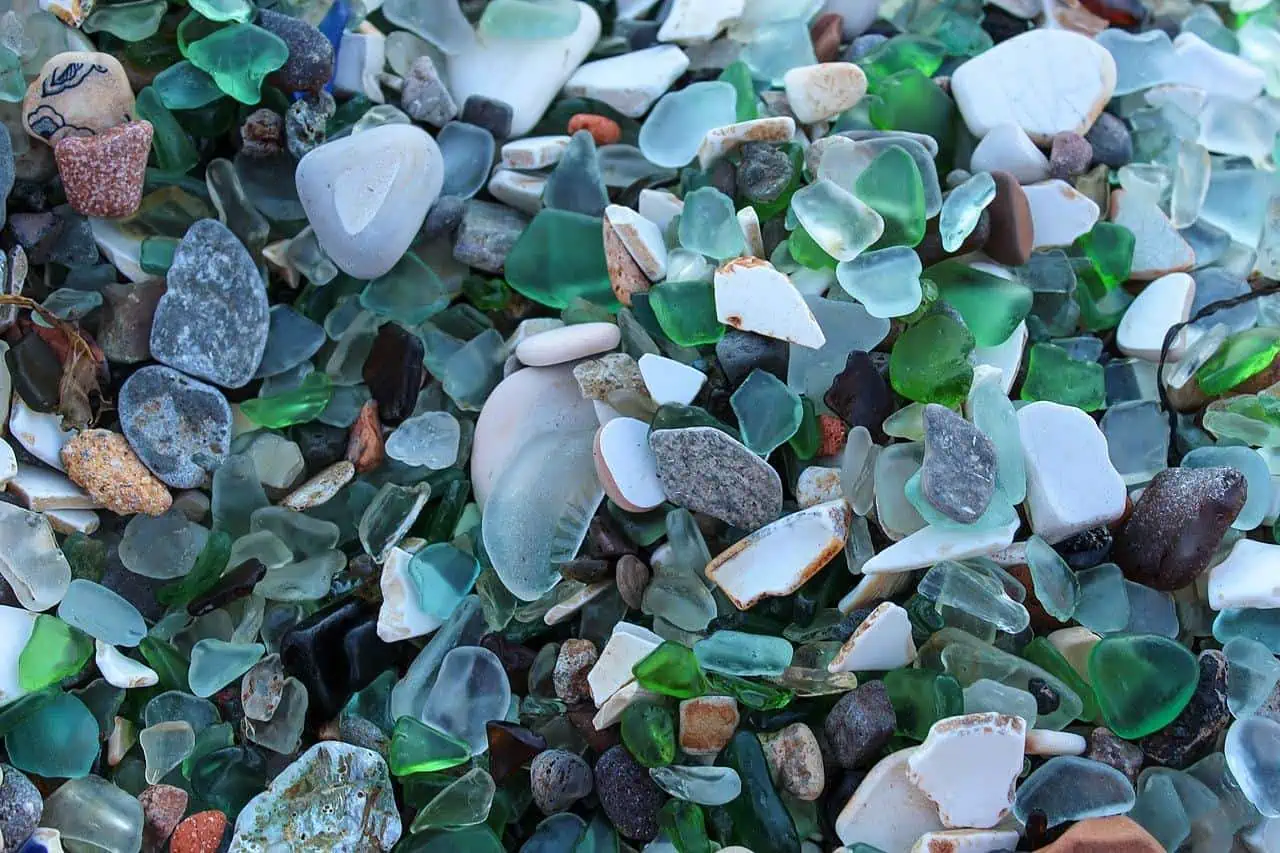
Serving as the eastern end of the Trans-Siberian Railway, Vladivostok is the Russian Far East’s largest city, as well as the country’s main pacific port. After more than 30 years where foreigners were completely restricted from visiting the city, Vladivostok’s wonders are being gradually rediscovered. Created as an unintended by-product of man-made pollution, the city’s Glass Beach is a breathtaking nook, one of only two of its kind anywhere in the world.
Nestled along the shore of Ussuri Bay, the Glass Beach is located 15 kilometers northeast of Vladivostok downtown, taking about 25 minutes to reach by car. While the beach is poorly served by public transportation, bus no.26 from Lugovaya square passes nearby.
Admission fees of 150 Rubles per person and 250 Rubles per car, 2 and 3.5 USD respectively, are collected upon entrance.

The Pacific Ocean's waves battering at the numerous pieces of glass in the beach
photography by: Angelikagub/ Wikimedia Commons
On a first glance, the Glass Bay (Бухта Стеклянная – Bukhta Steklyannaya) might seem like a regular and even a dull beach. However, at a 15-meter distance from the water, you’ll unanticipatedly come upon a mind-boggling sight, as the narrow strip of pebbles along the ocean is actually consists of small pieces of glass, porcelain, floor tiles and ceramics.

A closer look of the pebbles, with their unique colors, shapes and sizes
photography by: Angelikagub/ Wikimedia Commons
Curiously, there are several conflicting theories as to the source of this unusual wonder, yet all of which agree that the glass pebbles originated as a sort of garbage a couple of decades ago. Over the years, the millions of debris fragments were polished by the sheer power of the ocean, transforming their sharp edges into smooth elliptic shape, and as such, they became perfectly safe to walk on with bare feet.
The glass beach is an exceedingly rare phenomenon, with only one another instance, a beach in Fort Bragg, California, existing elsewhere across the world.
According to one version, the beach earned its glassy jewels after several lorries dumped a large amount of waste into the nearby bay. Since the beach is entirely engulfed by cliffs and hills, it is protected from wind in all directions, and so, any waste that washed away to its shores has remained over there.
Others however, claim that the unusual pebbles are simply the remnants of a landfill that used to operate a short distance away, which during its heyday people would often pinch their noses when walking by as the stench was unbearable.
Another widespread opinion among locals is that an adjacent ceramic factory disposed its waste by dropping tens of thousands of bottles, tiles and potteries into the beach. While no theory has yet to be fully verified, the latter is the most plausible, as it accounts for the presence of numerous ceramic chunks amid the glass pebbles.
The stunning hodgepodge of glass stones ranges in size, form and most notably, color. Vividly blue gems alongside hardened resin-like reddish pebbles and phosphorescent green pieces all coalesce into what many visitors describe as a carpet of candies. It might come as a surprise but if you dig deep enough, you’ll come across a layer of black volcanic sand, that up until few decades ago, dominated the beach.
Unfortunately, this utter wonder that turned rubbish into marvelous gems is slowly, but steadily disappearing. The same forces of nature that once sculpted the debris into glass pebbles incessantly erode them until the point, in which they will eventually become indistinguishable from grains of sand. To make matters worse, curious visitors as well as professional jewelers who frequent the beach decide to keep dozens of pebbles as a souvenir, dwindling their numbers even further. If you opt to visit this wondrous beach one day, keep in mind that this beauty is fragile, and ours to save.